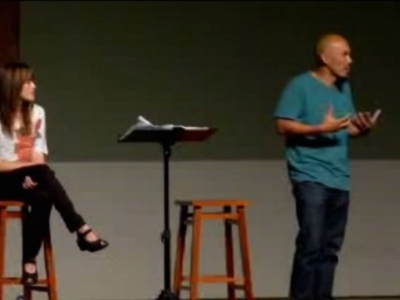Marriage and Parenting outside Eden—The Story of Jacob
'The account of Jacob and his family ... is about how God can work through the mess and grime of family life to achieve his glorious purposes...'
The account of Jacob and his family occupies almost half of the book of Genesis. It’s a captivating story about how God’s holy, eternal promises have coursed through the veins of very weak and finite human beings; it’s about how God can work through the mess and grime of family life to achieve his glorious purposes.
And God knows that I need to hear that story today. My family life seems weak—often it feels like we’re just skating on the thin ice of civility, with chaos lying in wait just under the surface.
How could God possibly be at work in this very human family?
When we come to the story of Jacob, it is very clear that his family, like mine, lives outside the Garden of Eden.
When marriage isn’t perfect
In the beginning, God gave humanity the gift of marriage, by which “a man will leave his father and mother and be united to his wife, and they will become one flesh” (Genesis 2:24). In spite of this, Jacob ends up with two wives, Leah and Rachel, and experiences the consequences of distorting God’s ideals in this way. Jacob’s wives compete with one another to win his affection and to bear his children. Jacob can’t help favouring one wife over the other and favouring her children over the others.
Marriage was the God-given context in which a man and a woman could “be fruitful and increase in number” (Genesis 1:28). But when Jacob’s wives fail to conceive children, they distort this ideal by practising surrogacy—Jacob sleeps with his wives’ maidservants in order to conceive children.
When having children isn’t perfect
Ever since the fall of humanity, childbirth has been difficult and dangerous (see Genesis 3:16). Jacob’s wife Rachel experienced the heartache of infertility; she became so desperate that she said to him, “Give me children, or I’ll die!” (Genesis 30:1). Eventually, God enabled Rachel to conceive a son. But Rachel’s story had a tragic ending: after giving birth to a second son, she died. Rachel called the child Ben-Oni, which means “son of my trouble”.
The pain of bringing children into this fallen world is not just physical. When we realise that we cannot always protect our children from danger or death, the pain can be almost too much to bear. When Jacob thinks that Joseph is dead, he refuses to be comforted, saying, “In mourning will I go down to the grave to my son” (Genesis 37:35). The death of a child wounds a parent for life.
When siblings aren’t perfect
Jacob’s family life is also blighted by intense conflict between siblings. Jacob provoked his own twin brother, Esau, by taking his paternal blessing and had to escape because Esau wanted to kill him. Jacob’s two wives were also sisters, torn apart by envy and rivalry. This problem carried on into the next generation: Jacob’s sons turned on each other, and sold his favourite son, Joseph, into slavery.
But God made a promise to Jacob’s family
In spite of all this, Jacob’s family was God’s chosen channel of blessing to humanity. At Bethel, God said to Jacob: “I am the LORD, the God of your father Abraham and the God of Isaac. I will give you and your descendants the land on which you are lying. Your descendants will be like the dust of the earth … All peoples on earth will be blessed through you and your offspring” (Genesis 28:14).
Jacob later blessed his son Judah with the words, “The sceptre will not depart from Judah, nor the ruler’s staff from between his feet, until he comes to whom it belongs and the obedience of the nations is his” (Genesis 49:10).
One day, a descendant of Jacob would be a king for all nations; he would open the way for all people to join God’s chosen family by faith. God would use this very flawed human family to bring his salvation into the world.
Marriage and Parenting after the Promised One
Our families also live outside the Garden of Eden, where sin and death take their toll. I know the ideals I had about marriage and parenting have certainly lost their shine. My mental lists of “Things I’ll never do” and “Things I’ll never say” now stand as my condemnation.
But—praise God—the Promised One in Jacob’s line has arrived! And his death for our sins can transform fallen families. Through Jesus, God lovingly forgives us and welcomes us into his spiritual family. Experiencing this love of God helps us to love our earthly families.
Our imperfect marriages can be transformed by our union with Christ, who “loved the church and gave himself up for her to make her holy, cleansing her by the washing with water through the word” (Ephesians 5:26-7).
Our imperfect parenting can be transformed by our adoption into God’s loving family: “Follow God’s example, therefore, as dearly loved children and live a life of love, just as Christ loved us and gave himself up for us” (Ephesians 5:1-2).
And we have the help of another Promised One—the Holy Spirit—who does God’s work in the lives of very weak and finite human beings. He helps us to acknowledge our sin, he assures us of our Father’s love and forgiveness, and he empowers us to keep on striving to love like our Father does. God’s Spirit is a pledge, promising that while we live outside Eden for now, we are bound for God’s perfect new creation.
Dear God,
Every day, we are painfully aware that we live in a fallen world, where marriage and parenting are not perfect. Thank you that your Promised One, Jesus, has arrived, to wash us clean and bring us into your eternal family. May your Holy Spirit help us to live each day for your glory, and for the good of others, especially our families.
Amen.
Harriet Connor lives on the Central Coast of NSW with her husband and three sons. She is the author of Big Picture Parents: Ancient Wisdom for Modern Life. Find out more at www.harrietconnor.com.
For more articles from Growing Faith, subscribe to our monthly e-newsletter.
To hear about the latest books and resources from Youthworks Media, subscribe here.






